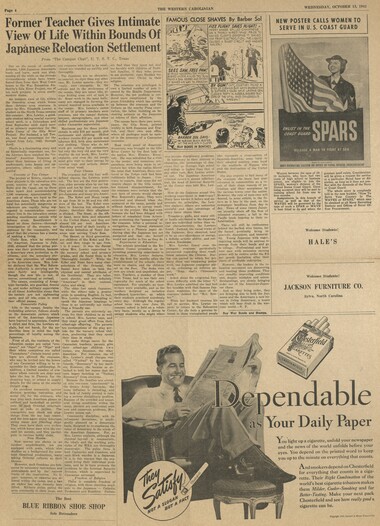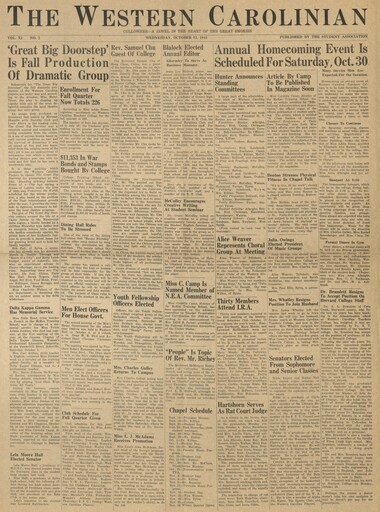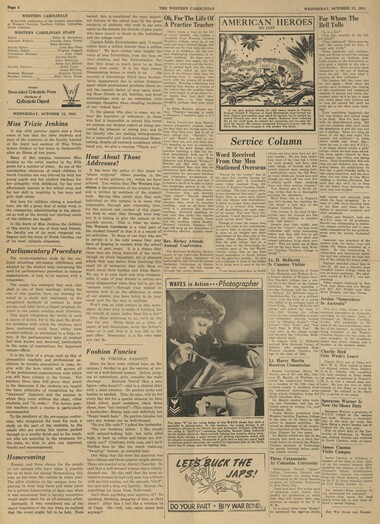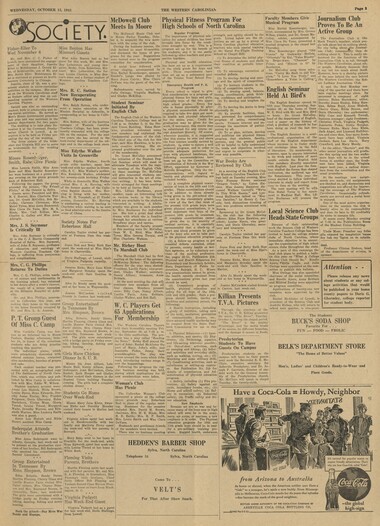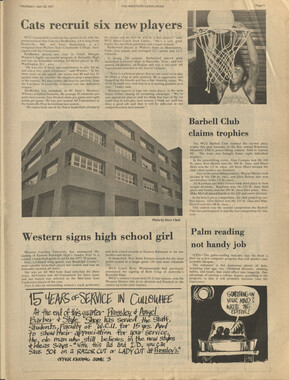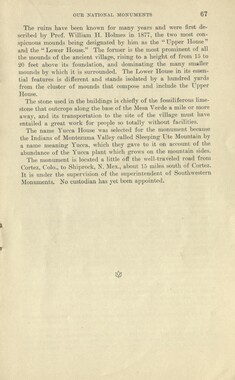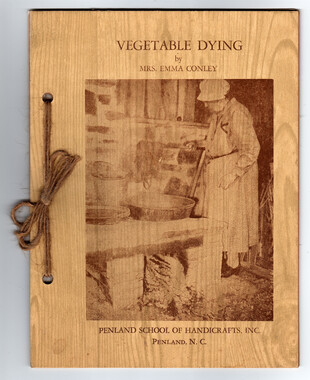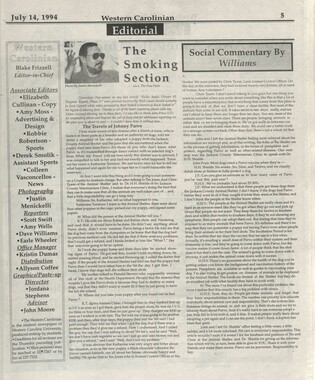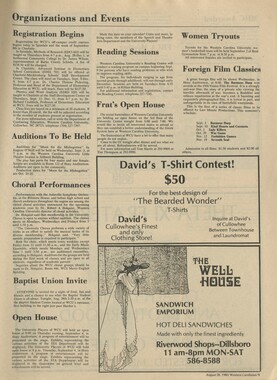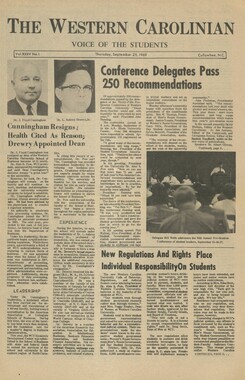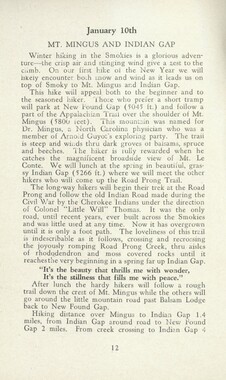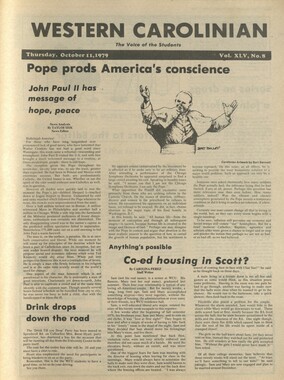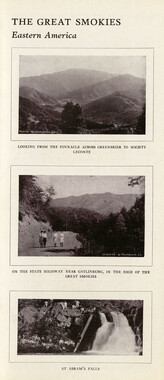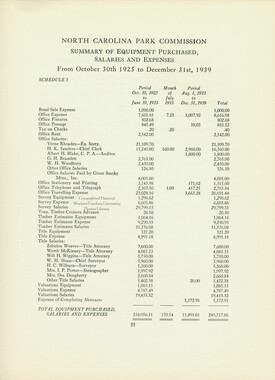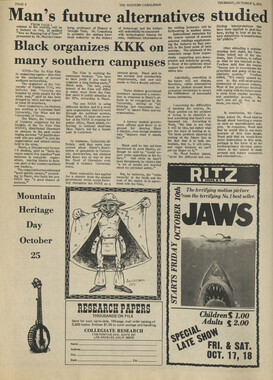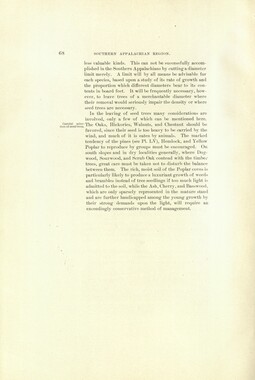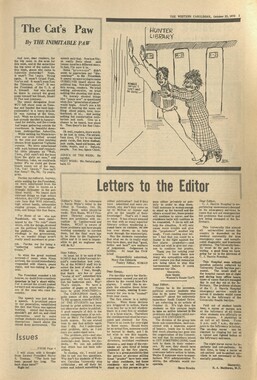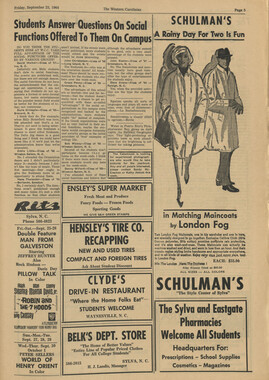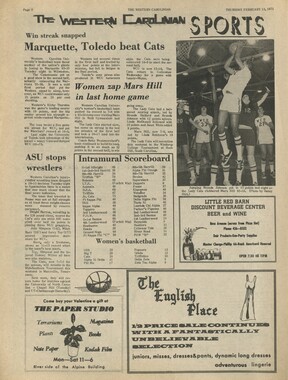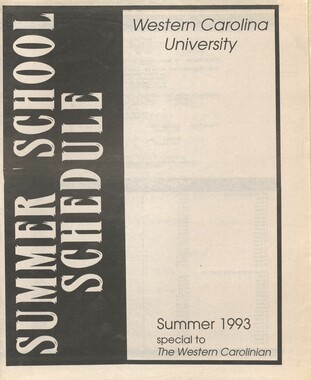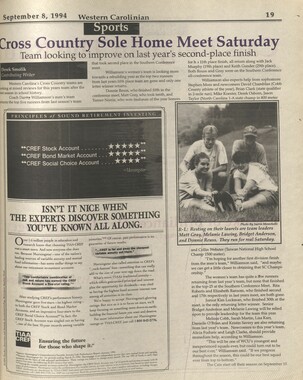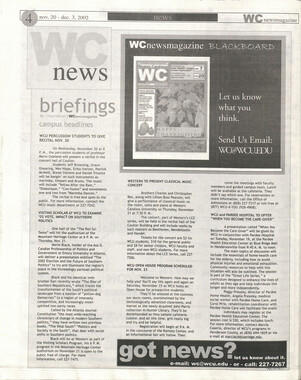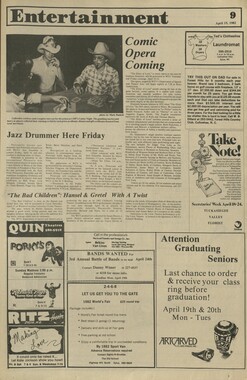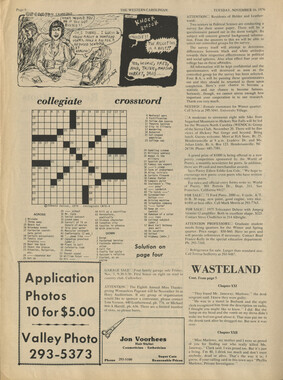Western Carolina University (20)
View all
- Canton Champion Fibre Company (2308)
- Cherokee Traditions (293)
- Civil War in Southern Appalachia (165)
- Craft Revival (1942)
- Great Smoky Mountains - A Park for America (2767)
- Highlights from Western Carolina University (430)
- Horace Kephart (941)
- Journeys Through Jackson (154)
- LGBTQIA+ Archive of Jackson County (24)
- Oral Histories of Western North Carolina (314)
- Picturing Appalachia (6772)
- Stories of Mountain Folk (413)
- Travel Western North Carolina (160)
- Western Carolina University Fine Art Museum Vitreograph Collection (129)
- Western Carolina University Herbarium (92)
- Western Carolina University: Making Memories (708)
- Western Carolina University Publications (2283)
- Western Carolina University Restricted Electronic Theses and Dissertations (146)
- Western North Carolina Regional Maps (71)
- World War II in Southern Appalachia (131)
University of North Carolina Asheville (6)
View all
- Allanstand Cottage Industries (62)
- Appalachian National Park Association (53)
- Bennett, Kelly, 1890-1974 (1388)
- Berry, Walter (76)
- Brasstown Carvers (40)
- Carver, George Washington, 1864?-1943 (26)
- Cathey, Joseph, 1803-1874 (1)
- Champion Fibre Company (233)
- Champion Paper and Fibre Company (297)
- Cherokee Indian Fair Association (16)
- Cherokee Language Program (22)
- Crowe, Amanda (40)
- Edmonston, Thomas Benton, 1842-1907 (7)
- Ensley, A. L. (Abraham Lincoln), 1865-1948 (275)
- Fromer, Irving Rhodes, 1913-1994 (70)
- George Butz (BFS 1907) (46)
- Goodrich, Frances Louisa (120)
- Grant, George Alexander, 1891-1964 (96)
- Heard, Marian Gladys (60)
- Kephart, Calvin, 1883-1969 (15)
- Kephart, Horace, 1862-1931 (313)
- Kephart, Laura, 1862-1954 (39)
- Laney, Gideon Thomas, 1889-1976 (439)
- Masa, George, 1881-1933 (61)
- McElhinney, William Julian, 1896-1953 (44)
- Niggli, Josephina, 1910-1983 (10)
- North Carolina Park Commission (105)
- Osborne, Kezia Stradley (9)
- Owens, Samuel Robert, 1918-1995 (11)
- Penland Weavers and Potters (36)
- Roberts, Vivienne (15)
- Roth, Albert, 1890-1974 (142)
- Schenck, Carl Alwin, 1868-1955 (1)
- Sherrill's Photography Studio (2565)
- Southern Highland Handicraft Guild (127)
- Southern Highlanders, Inc. (71)
- Stalcup, Jesse Bryson (46)
- Stearns, I. K. (213)
- Thompson, James Edward, 1880-1976 (226)
- United States. Indian Arts and Crafts Board (130)
- USFS (683)
- Vance, Zebulon Baird, 1830-1894 (1)
- Weaver, Zebulon, 1872-1948 (58)
- Western Carolina College (230)
- Western Carolina Teachers College (282)
- Western Carolina University (1794)
- Western Carolina University. Mountain Heritage Center (18)
- Whitman, Walt, 1819-1892 (10)
- Wilburn, Hiram Coleman, 1880-1967 (73)
- Williams, Isadora (3)
- Cain, Doreyl Ammons (0)
- Crittenden, Lorraine (0)
- Rhodes, Judy (0)
- Smith, Edward Clark (0)
- Appalachian Region, Southern (2393)
- Asheville (N.C.) (1886)
- Avery County (N.C.) (26)
- Blount County (Tenn.) (161)
- Buncombe County (N.C.) (1664)
- Cherokee County (N.C.) (283)
- Clay County (N.C.) (555)
- Graham County (N.C.) (233)
- Great Smoky Mountains National Park (N.C. and Tenn.) (478)
- Haywood County (N.C.) (3522)
- Henderson County (N.C.) (70)
- Jackson County (N.C.) (4692)
- Knox County (Tenn.) (25)
- Knoxville (Tenn.) (12)
- Lake Santeetlah (N.C.) (10)
- Macon County (N.C.) (420)
- Madison County (N.C.) (211)
- McDowell County (N.C.) (39)
- Mitchell County (N.C.) (132)
- Polk County (N.C.) (35)
- Qualla Boundary (981)
- Rutherford County (N.C.) (76)
- Swain County (N.C.) (2113)
- Transylvania County (N.C.) (247)
- Watauga County (N.C.) (12)
- Waynesville (N.C.) (68)
- Yancey County (N.C.) (72)
- Aerial Photographs (3)
- Aerial Views (60)
- Albums (books) (4)
- Articles (1)
- Artifacts (object Genre) (228)
- Biography (general Genre) (2)
- Cards (information Artifacts) (38)
- Clippings (information Artifacts) (191)
- Crafts (art Genres) (622)
- Depictions (visual Works) (21)
- Design Drawings (1)
- Drawings (visual Works) (184)
- Envelopes (73)
- Facsimiles (reproductions) (1)
- Fiction (general Genre) (4)
- Financial Records (12)
- Fliers (printed Matter) (67)
- Glass Plate Negatives (381)
- Guidebooks (2)
- Internegatives (10)
- Interviews (811)
- Land Surveys (102)
- Letters (correspondence) (1013)
- Manuscripts (documents) (619)
- Maps (documents) (159)
- Memorandums (25)
- Minutes (administrative Records) (59)
- Negatives (photographs) (5835)
- Newsletters (1285)
- Newspapers (2)
- Occupation Currency (1)
- Paintings (visual Works) (1)
- Pen And Ink Drawings (1)
- Periodicals (193)
- Personal Narratives (7)
- Photographs (12975)
- Plans (maps) (1)
- Poetry (5)
- Portraits (1663)
- Postcards (329)
- Programs (documents) (151)
- Publications (documents) (2237)
- Questionnaires (65)
- Scrapbooks (282)
- Sheet Music (1)
- Slides (photographs) (402)
- Sound Recordings (796)
- Specimens (92)
- Speeches (documents) (15)
- Tintypes (photographs) (8)
- Transcripts (322)
- Video Recordings (physical Artifacts) (23)
- Vitreographs (129)
- Text Messages (0)
- A.L. Ensley Collection (275)
- Appalachian Industrial School Records (7)
- Appalachian National Park Association Records (336)
- Axley-Meroney Collection (2)
- Bayard Wootten Photograph Collection (20)
- Bethel Rural Community Organization Collection (7)
- Blumer Collection (5)
- C.W. Slagle Collection (20)
- Canton Area Historical Museum (2110)
- Carlos C. Campbell Collection (282)
- Cataloochee History Project (65)
- Cherokee Studies Collection (4)
- Daisy Dame Photograph Album (5)
- Daniel Boone VI Collection (1)
- Doris Ulmann Photograph Collection (112)
- Elizabeth H. Lasley Collection (1)
- Elizabeth Woolworth Szold Fleharty Collection (4)
- Frank Fry Collection (95)
- George Masa Collection (173)
- Gideon Laney Collection (452)
- Hazel Scarborough Collection (2)
- Hiram C. Wilburn Papers (28)
- Historic Photographs Collection (236)
- Horace Kephart Collection (861)
- Humbard Collection (33)
- Hunter and Weaver Families Collection (1)
- I. D. Blumenthal Collection (4)
- Isadora Williams Collection (4)
- Jesse Bryson Stalcup Collection (47)
- Jim Thompson Collection (224)
- John B. Battle Collection (7)
- John C. Campbell Folk School Records (80)
- John Parris Collection (6)
- Judaculla Rock project (2)
- Kelly Bennett Collection (1407)
- Love Family Papers (11)
- Major Wiley Parris Civil War Letters (3)
- Map Collection (12)
- McFee-Misemer Civil War Letters (34)
- Mountain Heritage Center Collection (4)
- Norburn - Robertson - Thomson Families Collection (44)
- Pauline Hood Collection (7)
- Pre-Guild Collection (2)
- Qualla Arts and Crafts Mutual Collection (12)
- R.A. Romanes Collection (681)
- Rosser H. Taylor Collection (1)
- Samuel Robert Owens Collection (94)
- Sara Madison Collection (144)
- Sherrill Studio Photo Collection (2558)
- Smoky Mountains Hiking Club Collection (616)
- Stories of Mountain Folk - Radio Programs (374)
- The Reporter, Western Carolina University (510)
- Venoy and Elizabeth Reed Collection (16)
- WCU Gender and Sexuality Oral History Project (32)
- WCU Mountain Heritage Center Oral Histories (25)
- WCU Oral History Collection - Mountain People, Mountain Lives (71)
- WCU Students Newspapers Collection (1744)
- Western North Carolina Tomorrow Black Oral History Project (69)
- William Williams Stringfield Collection (2)
- Zebulon Weaver Collection (109)
- African Americans (390)
- Appalachian Trail (35)
- Artisans (521)
- Cherokee art (84)
- Cherokee artists -- North Carolina (10)
- Cherokee language (21)
- Cherokee pottery (101)
- Cherokee women (208)
- Church buildings (167)
- Civilian Conservation Corps (U.S.) (110)
- College student newspapers and periodicals (1830)
- Dams (103)
- Dance (1023)
- Education (222)
- Floods (61)
- Folk music (1015)
- Forced removal, 1813-1903 (2)
- Forest conservation (220)
- Forests and forestry (917)
- Gender nonconformity (4)
- Great Smoky Mountains National Park (N.C. and Tenn.) (154)
- Hunting (38)
- Landscape photography (10)
- Logging (103)
- Maps (84)
- Mines and mineral resources (8)
- North Carolina -- Maps (18)
- Paper industry (38)
- Postcards (255)
- Pottery (135)
- Railroad trains (71)
- Rural electrification -- North Carolina, Western (3)
- School integration -- Southern States (2)
- Segregation -- North Carolina, Western (5)
- Slavery (5)
- Sports (452)
- Storytelling (245)
- Waterfalls -- Great Smoky Mountains (N.C. and Tenn.) (66)
- Weaving -- Appalachian Region, Southern (280)
- Wood-carving -- Appalachian Region, Southern (328)
- World War, 1939-1945 (173)
Western Carolinian Volume 11 Number 02
Item
Item’s are ‘child’ level descriptions to ‘parent’ objects, (e.g. one page of a whole book).
-
-
Page 4 THE WESTERN CAROLLMAN WEDNESDAY, OCTOBER 13, 1943 Former Teacher Gives Intimate View Of Life Within Bounds Of Japanese Relocation Settlement From "The Campus Chat", U. T. S. T. C, Texas Out on the sands of southern any evacuees who tend to be recal- ers rind that they must not deal Arizona, 1.500 Japanese Americans itranl are rounded up swiftly and too harshly with children of Budd- FAMOUS CLOSE SHAVES By Barber Sol teach and learn, work and play, thoroughly. musing all the while on the strange The Japanese are no shrewder, circumstances which have trans- ,,„ smarter, no slyer than any other ferred them from their West Coast race, Mr. Lewter asserts—they are homes to the War Relocation Au- imply over - energetic. In the thority's Gila River Project, one of ten such projects in seven southwestern states. An intimate view of life within the fenced-in areas which house those defense area evacuees is given by Mrs. Elizabeth Lewter, a student on the North Texas campus this summer. Mrs. Lewter, a graduate student taking special nursery school work, is a Coloradoan and from September until April served as primary supervisor for the Butte Camp of the Gila River Project. Her husband, a tall Texan, was fiscal accountant for the project from July, 1942, through April. Theirs is a fascinating story and an historically important one, for- the Lewters have watched the "relocated" American Japanese go about their business of living in confinement, some happy and appreciative, others sullen and resentful Consists of Two Camp* The project at Rivers, similar to other projects in the relocation program, consists of two camps, the Butte and the Canal, set up three miles apart and accommodating 1,500 evacuees, approximately 80 per cent of whom are loyal to the schools and in the workrooms of the camps, they are never idle, always finding some sort of task to do. Some work in the mess halls; many are engaged in farming the several hundred acres available to the camps. Mrs. Lewter's entire staff of 18 primary teachers were evacuees, and the camps' doctors, lawyers, stenographers, and other skilled professionals are Japanese under Caucasian supervision. Maximum pay for these professionals is only $19 per month, plus sustenance and clothing. Skilled workers receive $16 per month and laborers $12, both plus sustenance and clothing. Those who do not work get nothing but sustenance, but only the very old and the very wealthy do not work, Mrs. Lewter explains, and even the old people must give vent to their energy by carving toys and artistic decors from scrap wood. Four Classes The evacuees fall into four well- defined classes, the Lewters point out. The Isei are the first generation, older persons alien by our legation and not by their own choice. They are divided in opinion, many pro-Japanese and many pro-American. The Kebei and Nesei range American cause. Those who are not ' in age from 20 to 30 and are chil- loyal but potentially dangerous as j dren of the Isei. The Kebei were saboteurs are rapidly being seg- j born in America but educated in regated in concentration camps; i Japan; therefore their allegiance others live in the relocation camps is divided. The Nesei, on the oth- pending resettlement outside vital ' er hand, were born and educated defense areas. Resettlement is I in the United States, and they are based on three factors—thorough ! almost 100 per cent American, investigation of the evacuee, ac- Marching proof of their loyalty is ceptance by the community, and i the whole battalion of Nesei Jap- proof that the evacuee has a means of making a living. anese now serving Uncle Sam. hist families, if they seem prone to use profanity, since Kuddah has precedence over Christ in their religion. The evacuees are privileged to own a limited number of pets licensed by the Health Department. However, the pet problem is rendered more complicated by the great friendship which has sprung up between the evacuees and the Indians on the nearby Pima reservation, the latter insisting on bestowing animals on the Japanese as tokens of their affection. The camps have their own newspaper, the Gila News, printed weekly in both Japanese and English, and their own post office, | where all packages must be opened in the presence of a Caucasian inspector. Most vivid proof of American democracy was brought to the Gila River Center by the first lady of the nation. Mrs. Eleanor Roosevelt. She was scheduled for a visit to the center, and numerous preparations were being made to entertain her when the radios blared the news that American fliers captured in the Tokyo raid had been ruthlessly killed in Japan. Contrary to reports, that news did not inspire cheers in the Gila camps, but instead disappointment, for the evacuees were certain that the new turn of events would change Mrs. Roosevelt's plans. They were surprised and pleased when she appeared at the camp, quietly and without fanfare, to survey conditions on the project. She had come because she had been deluged with letters of complaint from Arizon- ians protesting the "pampering" of the evacuees. After a personal investigation, her formal statement appeared in a Phoenix paper declaring that the Japanese are not FIZZ FLIGHT SAVES PLIGHT! a MERRV MAKER. SPiLtED CHAMPAGNE ON A PO0P.L.W WIRED 'MIKE" PRiOB To XAVlER. CU6ATS GRASPING IT, SAVED UIM FROM ELECTROCUTION. THE LIQUID CAUSED A SHORT CiRC--.iT AMP WARMED JAVIER SEES SAW, FREEPAW! 65 vr-olD woodsman, Tom mcgrath, BURiED UNDER A HuGE TREE-TRUNK found a saw nearby amd PATIENTLY SAwED his WAY To FREEDOM. NEW POSTER CALLS WOMEN TO SERVE IN U.S. COAST GUARD By GUM.' ca?t, courtwey found a STICK OF CHEWING GUM WHICH ENABLED HIM TO SUPPRESS A COUGH WHILE LANDING GEN. CLARKE'S PARTY IN ALGERIA, ENSURED SUCCESS OF THE VITAL AND DANGEROUS ffMW,SSIONI/ BARBER SOL SAYS • be your own Block Buster, hit the axis with a cluster Buy BONDS IN BUNCHES wise become disciplinary problems. In testimony to their interest in education, the percentage of Japanese that go through high school and college is higher than that of any other race, Mrs. Lewter pointed out. The Japanese American criminal record is almost infinitesimal, the head of Internal Security at the Center once told Mrs. Lewter. who represent a cross-section of Japanese-America, some loyal to their adopted country, some loyal to the warlords of Nippon who seek the destruction of the United States. She also expects to find many of the evacuees she knew last year relocated in communities as a result of their clean records of patriotism and their acceptance by Hmmmn?&^nggjrocmctwnmokkib tmmmmmi How do the Japanese accept this j the various towns over the nation. working experiment in democracy? | However, the rate of turn-over will Uncle Sam, when he relocated are children of the Kebei and Ne- The Sansei, or third generation, pampered and that she herself the American Japanese in July, 1942, stressed that the prime purpose was their protection, because sei, and they range in age from 1 to 6 years. It was the Sansei whom Mrs. Lewter supervised in a democracy owes protection to its , the nursery school and primary citizens, and the secondary pur- grades, and she found them to be pose was prevention of sabotage "thoroughly lovable." While the 10 the American cause. Mrs. Lew- Kebei and Nesei have many charter declares that the War Reloca- acteristics of the Oriental, the tion Authority is carrying out its Sansei have taken on both the aims fairly and intelligently, physical and mental attributes of though the new life is not, of , the Occidental. They are taller, would not prefer to live as they do. Experiment in Education The schools provided in the Relocation Center presented an interesting pioneering experiment in education. Mis. Lewter declares. Many have known it before and ap predate its principles, the Lewters declare; others are somewhat scornful and take advantage of every favor shown them. Treachery, guile, and many other faults attributed to the Japanese race are individual rather than racial characteristics, the Lewters found. Instead, the racial traits of the Japanese, they observed, tend to be an over-abundance of energy, a definite artistic ability, and outspoken frankness. Mrs. Lewter found even the youngest evacuees particularly unreserved regarding their tradi- depend, to some extent, in the future as it has in the past, on the newspaper headlines from day to day. News of some recent Japanese "atrocity shuts off the flow of relocated evacuees; a lull in the Pacific lends impetus to their rehabilitation. There will still be restlessness behind the barbed wire fences, for the forced proximity bring on quarrels, discontent, and immorality. Young Japanese with eager, inquiring minds will be anxious to emerge from their bonds and go to college. Professional and business men with extensive earning power will be restive under the $19 per month limitation after their Women between the ages of 20- 35 inclusive, who have had two years of high school or business school, are eligible to join the SPARS, women's division of the United States Coast Guard. Upon being accepted they will be sent to training school for from one to four months. Assignments in this branch of service as well as that of the WAVES will be governed by the type of work a SPAR or WAVE is best fitted to do and where the greatest need exists. Consideration will be given a request for service at a particular Naval base or Air station, as long as it does not conflict with the demands of the Navy or Coast Guard. The whole story is completely told in the new booklet, "How To Serve Your Country In The WAVES or SPARS," which may be obtained at all Navy Recruiting Stations and Offices of Naval Officer Procurement. Welcome Students! HALE'S course, conventional or normal. The camps, consisting of Army- type barracks, are guarded, fenced in, and under military supervision at all times. Authorities stress that more slender, and are definitely "American" in their customs, styles and slang. The older Isei speak Japanese, while the others take a greater the centers are not sightseeing pride in speaking English. In fact, spots, and all who come in must ! Mrs. Lewter assets, attempting to bear official passes Democratic Policy Life in the camps, despite the forbidding exterior, follows closely on the democratic pattern which most of the American Japanese have learned to appreciate. Control is strict and firm, the Lewters ex speak the Japanese language to them is an unfriendly act rather than a friendly one. The parents are extremely anxious for their children to do well in school, Mrs. Lewter says, and they exact great effort from their school-age offspring. The parents tional enemies, the Chinese. Dur For the first few months after the I ing one period in which her pri establishment of the schools, there'mary class was comparing poster years of profitable enterprise were no chairs, and the children work, one Japanese youngster pip- ! However, the leaders in the re- sat on the floor. The desks even ed up, criticizing an inferior pa- location movement are discovering now are crude and unpolished, she ! per, "Hmp, that's Chinaman's and meeting these problems. They says. Teachers, a number of them j work." lure steadily improving conditions from Texas, had to use their own Asked about the congenital Jap- and, despite mistakes and misun- ingenuity for much of the school anese difficulty with the letter "1," derstandings, are slowly bringing equipment. For example, no type- Mis. Lewter admitted she had had i order out of the American-Japan- writers were available, and so the her troubles with that famous Jap- ese chaos. teachers designed an imitation anese weakness, for most of the ' And as they bring order, they cardboard typewriter, on which evacuees dubbed her "Mrs. Rew- j are bringing also to both the Jap- their students practiced noiselessly ter." | anese and the Americans a new les- every day. Although the regular When her husband receives his [ son in living democracy, a lesson school term was over June 25, call to service, Mrs. Lewter ex- which will bear fruit in the war Welcome Students! JACKSON FURNITURE CO. summer school is held on a volun- pects to return to the Relocation tary basis, mostly as a device to Center, for she feels a genuine in- occupy students who might other- terest in these transplanted people time world.—V. P. Buy War Bonds and Stamps. Sylva, North Carolina plain, but not harsh, for the au- are contemptious of the play per thorities keep in mind the high iods for the nursery school chil- percentage of loyalty among the dren, preferring that they spend Japanese. First of all, the residents of the relocation camps are called "evacuees," not "Japs" or "Nips" and their white executives are called "Caucasians." Certain travel privileges are allowed the evacuees, who may be invited into the homes of any Caucasian willing to be responsible for their safekeeping. In addition, a limited number of ava- cuees whose records are clear may take the bus to Phoenix for the shopping tour, or attend to supply details for the camp at the nearby freight stop. An excellent community service division provides recreation and social life for the evacuees, who may play such American games as Softball and basketball or participate in such Oriental entertainment as judo, or jujitsu. The youngsters may check out play- • things from the toy loan center, and the teen-agers enjoy American swing music and jitterbug steps. They even have their own orchestra, which keeps pace with the current hit parade, and they participate in various hobby clubs. New Movies New movies are shown in an outdoor amphitheatre, not yet equipped with seats, which also doubles as a background for amateur theatrical productions, many taking Oriental cultures as their themes. However, such freedoms are tempered by necessary restrictions and contrabands and by the narrow limits of the reservation. No liquor, weapons, or cameras are allowed within the camp, and a ban on radios has only recently been lifted. Military police patrol the area constantly in their jeeps, and their time in study. To make things easier for the Caucasian teachers, parents give their school-age children two names, one Japanese, the other American. For instance, one of Mrs. Lewter's small charges was called "Yushmi" by her evacuee friends, "Rosemary" by her teachers. However, she became so attached to both her names that she soon began insisting on "Yushmi, Rosemary" from everyone. Because the families are crowded into one-room "apartments" in the dreary Army barracks, the home influence is dwindling, and the lack of family control is raising a serious disciplinary problem. Because of the crowded and unnatural living conditions within the camp, parents are confronted with new and numerous problems, Mrs. Lewter points out. Community discipline, with its infrequent deviations, is intelligently planned on a democratic basis, designed to re-emphasize the value of democracy in the minds of the American Japanese. For, as ! ! Mrs. Lewter explains, although the physical lay-out is communistic, the ideals and the working principles of the WRA are thoroughly democratic. The police force is both Caucasian and Japanese, and each block warden is a Japanese. It is to this warden that the evacuees bring their individual problems, and he in turn presents the problems to the Internal Security Division, which is supervised by Caucasian personnel. Freedom of Religion There is complete freedom of religion, with three churches available to the Japanese — Catholic, Protestant and Buddhist. Philoso- The Best BLUE RIBBON SHOE SHOP Sole Retreaders Daily Paper ght up a cigarette, unfold your newspaper news of the world unfolds before your You depend on the printed word to keep to the minute on everything that counts. And smokers depend on Chesterfield for everything that counts in a cigarette. Their Right Combination of the world's best cigarette tobaccos makes them Milder, Cooler-Smoking and far Better-Tasting. Make your next pack Chesterfield and see how really good a cigarette can be. Copyright 19-B, Liggett & Myers Tobacco Co
Object
Object’s are ‘parent’ level descriptions to ‘children’ items, (e.g. a book with pages).
-
The Western Carolinian is Western Carolina University’s student-run newspaper. The paper was published as the Cullowhee Yodel from 1924 to 1931 before changing its name to The Western Carolinian in 1933.
-
